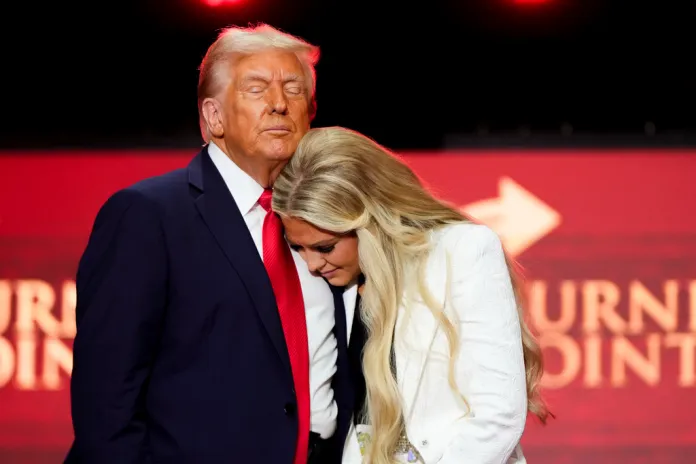PHOENIX, ARIZONA — At Charlie Kirk’s memorial, his widow Erika Kirk called for forgiveness and grace while President Donald Trump urged vengeance against political enemies; two starkly different visions now loom over the MAGA movement.
Erika grounded her remarks in faith but moved quickly to the heart of her message: forgiveness. She said Charlie had devoted his life to reaching “the lost boys of the West, the young men who feel like they have no direction,” including, she added pointedly, the one who killed him. “He wanted to save young men just like the one who took his life,” she said.
Quoting from scripture, Erika told the crowd she was choosing to forgive. “On the cross our savior said, father, forgive them, for they not know what they do,” she said. “That man, that young man. I forgive him. I forgive him because it is what Christ did and it is what Charlie would do.”
She insisted that her husband’s legacy demanded love, not retaliation. “The answer to hate is not hate,” she said. “The answer we know from the gospel is love and always love. Love for our enemies and love for those who persecute us.”
Her words brought the stadium to its feet in a standing ovation, the crowd roaring at the widow’s declaration of mercy less than two weeks after the killing. Her message cast her late husband’s legacy in spiritual terms, a nonviolent politics rooted in grace rather than vengeance.
Minutes later, Trump stepped up and offered a different vision of how to respond to Kirk’s assassination. “I call it the radical Left, I call it sometimes the radical Left lunatics. But, Charlie didn’t say that; he called that the Left. He was probably right, but I can’t help it,” he told the cheering stadium.
He went further: “He did not hate his opponents; he wanted the best for them. That’s where I disagreed with Charlie; I hate my opponents, and I don’t want the best for them. I am sorry, I am sorry, Erika. But now Erika can talk to me and the whole group, and maybe they can convince me that is not right, but I can’t stand my opponents … Charlie’s angry at me, look, he’s angry at me now.”
That rhetoric hasn’t stayed onstage. In the days since Kirk’s death, Trump has pressed loyal allies to act on his grievances, urging Attorney General Pam Bondi to pursue cases against prominent Democrats, replacing a U.S. attorney in Virginia who resisted those efforts, and railing against television networks he claims shield the left, even hinting at pulling broadcast licenses. His administration has moved to classify antifa as a terrorist organization, floated the use of RICO statutes against George Soros, and launched probes into liberal funding streams. And after a House resolution honoring Kirk passed with dozens of Democrats voting no or present, the White House has singled them out repeatedly.

Their messages underscored the divide: Erika framed forgiveness as the path forward, while Trump argued that political opponents were driven by hatred and had to be confronted.
While Erika’s appeal was rooted in mercy, Trump’s was a license for payback. He drew a sharp contrast between himself and Kirk, portraying his late ally as conciliatory while casting himself as the blunt truth-teller. This signaled to his followers that hating their enemies was not only acceptable but expected.
“The violence comes largely from the left. You don’t hear that from too many people, do you?” Trump said at the memorial.
Some mourners were left wrestling with the split, including 24-year-old Lindsay Jones of Dallas. On her way home through Sky Harbor International Airport on Monday, wearing a MAGA hat and carrying Turning Point signs from the memorial, she reflected on the memorial.
“I thought Erika was so inspiring. When she said she forgave the man who murdered Charlie, the whole crowd reacted, just unthinkable for someone to express that kind of forgiveness less than two weeks after everything was taken from her,” Jones said.
“I definitely connected more with what Erika had to say than with Trump, but that’s just who he is. He says the quiet part out loud, and you can’t really blame him for that. What stayed with me most was Erika’s moment. I almost wish the memorial had ended with her, because it was just so powerful.”
Not everyone in Republican circles saw Trump’s remarks as fitting the moment. One Arizona-based strategist, speaking on condition of anonymity to be candid, said: “In this really difficult time, I think a lot of Americans look to our leaders to bring words of comfort, to calm the political storm, and that’s not what Trump did yesterday. But I don’t think anyone expected him to, to be quite honest. It would have been nice to have him rise to the occasion, but he just isn’t capable of that.”
ERIKA KIRK FORGIVES HUSBAND’S KILLER, PLEDGES TO GROW TURNING POINT USA IN HIS MEMORY
The White House dismissed the criticism. Press secretary Karoline Leavitt responded to how Trump’s remarks squared with calls to lower the political temperature: “The President is authentically himself, and that’s why millions of Americans love and support him, including Erika Kirk, who you saw so beautifully onstage leaning on the president for support during an unthinkable tragedy.”
The movement Charlie Kirk built now faces a choice between forgiveness and fury, between a path of mercy offered by his widow and the politics of confrontation urged by its most powerful voice.
